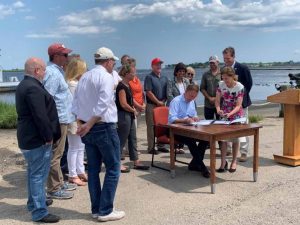
Stratford – Gov. Ned Lamont joined legislators, state officials, agricultural advocates and business representatives on July 23 for a bill signing ceremony near the shore of the Long Island Sound to commemorate the enactment of legislation implementing policies that will support continued growth of Connecticut’s shellfish industry in an effort to increase the populations of oysters along the state’s shoreline and protect the sustainability of this vibrant sector of the economy.
The shellfish industry is a significant sector of the Connecticut shoreline’s economy, generating more than $30 million in sales annually and supporting 300 jobs statewide. There are currently more than 70,000 acres of shellfish farms under cultivation in Connecticut.
The legislation:
- extends Public Act 490 protections – which were adopted more than 50 years ago and allow landowners to have their qualifying lands classified as farms and thereby subject to reduced property tax rates – to include aquaculture operations;
- allows more flexibility to actively manage the natural oyster beds in Long Island Sound, ensuring that Connecticut oysters will be available for future generations through better management of the natural beds; and
- reconstitutes and expands the Connecticut Seafood Council with new membership to drive the industry forward.
It received overwhelming support from business and agriculture organizations across the state, including the Connecticut Farm Bureau Association, the Connecticut chapter of the National Audubon Society, the Connecticut Restaurant Association, and numerous small business leaders that depend on the sustainability of Connecticut’s aquaculture to support their operations.

“Aquaculture is one of the fastest growing sectors in Connecticut, and this legislation continues to move the dial on this industry receiving some of the same protections and support that land farmers receive,” Gov. Lamont said. “My administration will continue focusing on commonsense changes like these that business owners in Connecticut deserve. I look forward to seeing this already great industry continue to grow. Let’s spread the word far and wide, Connecticut has some of the best oysters around.”
“This law ensures that the future for the industry is prosperous and encompassing of all the types of aquaculture industry in our state, including seaweed and indoor production,” Connecticut Agriculture Commissioner Bryan Hurlburt said. “The law also establishes parity and access to the property tax relief program, Public Act 490, to include aquaculture production, further ingraining this industry as a facet of Connecticut agriculture. Many thanks to the industry, the Connecticut Farm Bureau, and UConn Sea Grant for their partnership and commitment to this proposal and the future of the aquaculture in our state.”
“On behalf of its members and aquaculture farmers, the Connecticut Farm Bureau thanks Gov. Lamont and the legislature for their support of this very important legislation,” Connecticut Farm Bureau President Paul Larson and Executive Director Joan Nichols said in a joint statement. “This legislation provides both financial relief and equity in taxation for aquaculture farmers across Connecticut by expanding Public Act 490 to include aquaculture into the state’s definition of farmland.”
The governor noted that shellfish aquaculture also provides a number of environmental benefits, including by improving sediment quality through the harvesting process, stabilizing sediments and helping to protect the shoreline from erosion, and providing critical ecosystem functions by creating structure and habitat for other species that provide a food source for fish and other marine species.
The legislation is Public Act 21-24, An Act Concerning Connecticut’s Shellfish Restoration Program, The Connecticut Seafood Council and the Taxation of Certain Underwater Farmlands.